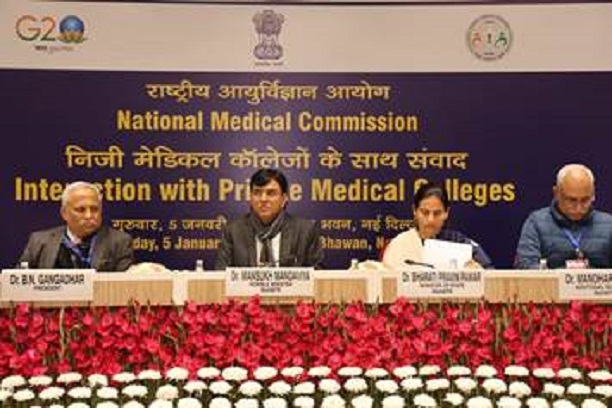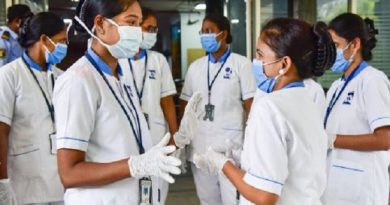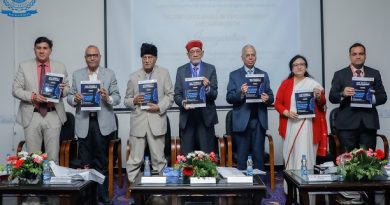Dr. Mansukh Mandaviya interacts with 150 representatives of private medical colleges in the presence of Dr. Bharati Pravin Pawar
In the presence of Dr. Bharati Pravin Pawar, Dr. Mansukh Mandaviya speaks with 150 representatives of private medical institutions.
The government’s aim and vision for medical education reform can only be realized if medical colleges play an active role. Dr. Mandaviya desired collaboration between government and private medical institutes to deliver higher medical education.
The number of medical schools has expanded from 384 in 2014 to 684 now. We must work hard to promote the “India Brand” of medical physicians and education, which exemplifies excellence and credibility: Bharati Pravin Pawar, M.D.
Dr. Mansukh Mandaviya, Union Minister of Health and Family Welfare, met with around 150 representatives of private medical colleges today at Vigyan Bhawan in the presence of Dr. Bharati Pravin Pawar, Union Minister of State for Health and Family Welfare.
Speaking on occasion, Dr. Mandaviya stated, “the desire and vision of the government for medical education reform can be accomplished only when the medical colleges are active participants. Consultation and samvaad are critical in creating this atmosphere. He remarked that an ecosystem and climate in which NMC and Medical Colleges collaborate to deliver superior-quality medical education is required.
The Union Health Minister requested the participation of NMC and Medical Colleges for strong medical education, emphasizing the need to restructure and control medical education, and warned those who do not share the objective of offering excellent medical education. He also proposed measures such as biometric attendance in medical facilities.
He emphasized that the government is dedicated to offering the greatest medical colleges and education. He stated that the government expanded the number of medical colleges from 387 in 2014 to 648 in 2015.
Dr. Bharati Pravin Pawar stated that the image of Indian physicians overseas has boosted India’s medical education sector’s recognition. “India’s incredible economic narrative has increased expectations from all sectors of India, of which health is a critical component,” she said. “As the Hon’ble Prime Minister has constantly emphasized, “sabka prayaas” can help the country develop stronger. The role of private medical institutions in bringing about a paradigm change in medical education is critical. “We should push hard for the “India Brand” of medical practitioners and educators, which exemplifies quality and integrity,” she added.
Various efforts undertaken by NMC to change medical education at the undergraduate level were presented to attendees. This included initiatives to achieve the Prime Minister’s goal of “One District, One Medical College,” the introduction of a yoga module, village outreach through the Family Adoption Program, medical education in multilingual languages, anti-raging cells, and the academic calendar for the 2022-23 batch.
The Medical Assessment Rating Board issues discussed included themes such as recognition of backlogs and clearing renewals; friction-free assessments; assessment in a window period or timeframe; reduction in the mismatch between assessor and specialty; availability of teachers in pre and para-clinical courses; face recognition and Aadhar Enabled Biometric System (AEBMS); feasibility of skill labs to compensate for less clinical load; and concerns about crowding by students. Dr. Mandaviya pushed the Academy and researchers to participate in research and innovation with the corporate sector. He also invited any suggestions from the crowd for strengthening India’s healthcare system.
Private medical college delegates praised the Union Health Minister for meeting with them and giving them the chance to give their thoughts, ideas, and suggestions on critical issues of medical education.
During the nearly two-hour-long ‘Samvaad,’ representatives from private medical colleges raised issues and made suggestions about NEET PG, NEXTT, admissions, faculty retirement age, journal publications, bond for rural posting, district residency programs, super specialty courses, an internship in community medicine, less faculty in some streams such as forensics, and so on.
Dr. Manohar Agnani, Addl. Secretary, MoHFW, Dr. B N Gangadhar, President NMC, Dr. Aruna Vanikar, President UGMEB (UG Medical Education Board), Dr. Vijay Oza, President PGMEB (PG Medical Education Board), and other NMC members were present, as were top MoHFW executives.




